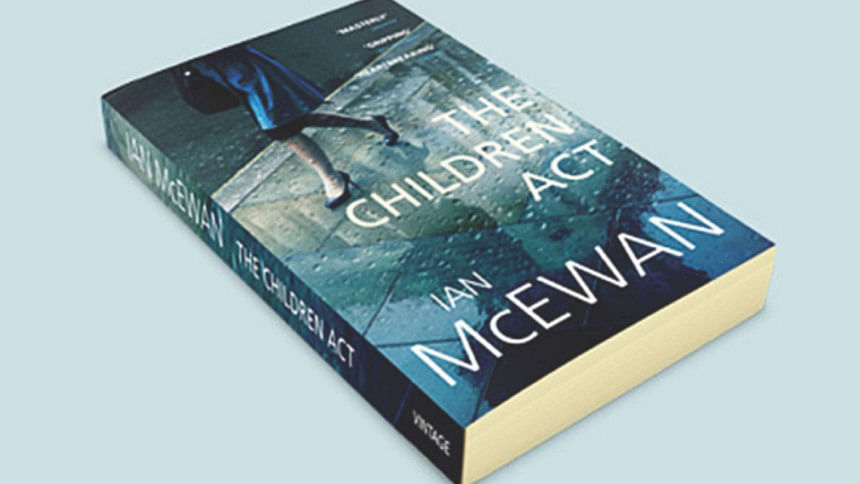The Children Act By Ian McEwan

The Man Booker Prize
This week, and the following, we will feature the work of two Booker Prize winning novelists, Ian McEwan and Richard Flanagan. The Man Booker Prize was instituted in 1969 with the goal to "promote the finest in fiction by rewarding the very best book of the year"
and awarded the prize to the best original full-length novel in the English language by a citizen of the British Commonwealth or Ireland. The restriction on nationality was removed in 2014. The Booker Prize, unlike the Nobel Prize, is considered in literary circles as the "best book of the year" award.
The list of past recipients of the award includes "Midnight's Children" (Salman Rushdie), "English Patient" (Michael Ondaatje), "Disgrace" (J.M. Coetze), "The God of Small Things" (Arundhati Roy), and "The Inheritance of Loss" (Kiran Desai).
The British novelist, Ian McEwan is a prolific writer and best-selling author of fifteen books. The book under review, "The Children Act", came out in 2014, and profiles the domestic and professional life of a middle-aged childless couple as they struggle to balance work and leisure in twenty-first century London. The book is an easy read, although some of the details the author interjects in the narrative and relates to medical procedures and the British legal system, particularly as it pertains to family law and minor children, are sometimes a little tricky to navigate through. However, overall, the reader will find this short volume fun to read as well as a good introduction to this intelligent and versatile writer.
The principal character Fiona Maye is a judge of the High Court and has been married for over thirty five years to Jack, a professor of ancient history. One day, out of the blue, Jack informs her that he is having an affair with a younger woman, and seeks her blessings. The excuse for this affair is the lack of passion, particularly sex, between them and he believes that the infidelity would strengthen their marriage. She obviously kicks him out of the house and goes about her own busy life which involves adjudicating several high-profile cases and preparing for a concert she is participating with another Barrister at the Inner Temple. At the end, Jack decides to come back, abandon his girl-friend, and seek forgiveness from Fiona. However, McEwan wastes no sympathy for Jack, when he writes, "She inferred from his evasive but morose remarks that in the statistician's bedroom he had not passed through the gates of paradise." They ultimately reconcile but not before she has her own short affair with a young man who was her protégé.
Ian Russell McEwan, an accomplished novelist and screenwriter, may not be a familiar name for my readers but he is very well known in the English-speaking world. He was awarded the prestigious Man Booker Prize in 1998 for his book, "Amsterdam". In 2008, The Times newspaper of London featured him on their list of "The 50 greatest English writer after 1945". However, many consider his book "Atonement", made into a successful movie, as his finest, and it brought him world-wide recognition. In 2009, Daniel Zalewski wrote of Ian McEwan. "All novelists are scholars of human behavior, but Ian McEwan pursues the matter with more scientific rigor than the job strictly requires."
I must concede that I have been a fan of the writer since I picked up the book "Amsterdam" many years ago. His plots are easy to follow and while there are nonlinearities, they don't have too many twists and turns, which is almost an exception among modern writers. While all the above might give the impression that Ian McEwan is a writer of fluffy novels, make no mistake! His novels "Atonement" and "Solar" have subtle and dramatic narratives and track characters in very complex situations.
The title of the book under review, "The Children Act", refers to a law of the same name, Children Act, passed in 1989 by the British Parliament and designed to protect the children. Judge Maye is a family court judge who in a couple of high-profile cases in the novel seeks to find resolutions to disputes that arise during marital squabbles, divorce, and religious beliefs of parents. In the case of a family that refuses to allow blood transfusion for their leukemia-stricken son Adam due to the injunctions of their religious denomination known as Jehovah's Witnesses, Maye decides to visit Adam, who is seventeen and a minor under the Children Act, before she rules on the hospital's appeal to administer transfusion. The exchange between Adam and Maye at the hospital is one of the finest chapters of the book. She sings to him lines from Yeats's "Down by the Salley Gardens."
Here is a snippet towards the end of the visit and after she gets up to leave.
(Adam) Stay just a tiny bit longer. Please!
(Fiona) Adam, I really do have to go now.
(Adam) Then let me have your email.
(Maye) Mrs. Justice Maye, Royal Courts of Justice, the Strand. That'll find me.
The judge is so impressed by Adam's wit, intelligence, and musical talents that she decides in favor of the hospital and against the wishes of Adam and his parents, and Adam is saved. And, now the storyline takes on an interesting twist. While the judge is on a judicial tour, Adam stalks her and shows up at the residence where she is staying. He tells her that he has given up on his own family and wants to come and stay with the judge. She bids him to leave but not before they exchange a kiss. Let me quote from this magical encounter.
"Lightly, she took the lapel of his thin jacket between her fingers and drew him toward her. Her intention was to kiss him on the cheek, but as she reached up and he stooped a little and their faces came close, he turned his head and their lips met. … She let go of his lapel and said again, "You must go."
There are many words to describe McEwan's writing style: melodic, translucent, and lucid. He avoids writing long sentences and understands that the average reader is often hard pressed for time and wants to be able to pick up where he/she left off. The other quality is his ability to bring to life the principal characters in their emotions without cluttering the narrative with long conversations or non-linear threads.
Here are two samples of his elegant prose from his reconstruction of the gradual path to reconciliation between Fiona and Jack. "Toward the end of the meal, when they had exhausted the safer topics, there came a threatening silence. Their appetites were gone, their desserts and half the wine were untouched. Unspoken mutual recrimination troubled them. Still on her mind, his brazen excursion; on his, she presumed her overblown sense of injury."
And the last line, "They lay face-to-face in the semidarkness, and while the great rain-cleansed city beyond the room settled to its softer nocturnal rhythms and their marriage uneasily resumed, she told him in a steady quiet voice of her shame, of the sweet boy's passion for life and her part in his death".
The reviewer lives and works in Boston, USA.

 For all latest news, follow The Daily Star's Google News channel.
For all latest news, follow The Daily Star's Google News channel. 



Comments